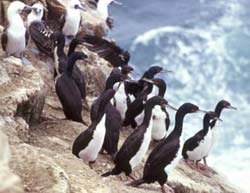Computer security – or the apparent lack of it – is increasingly a worry for network administrators. But viruses and other such vulnerabilities are no mystery for Europe’s Computer Security Incident Response Teams, now also finding their feet in the European Union’s newest Member States.
Creating and managing Computer Security Incident Response Teams (CSIRTs) is just one of the topics at this year’s Computer Security Incident Handling Conference. Organised by FIRST (Forum of

In the late 19th and early 20th centuries, the tens of millions of marine birds living in the “Bird Islands of Peru” became famous around the world. This was due to their appeal as a visual spectacle and because they became economically important as high producers of guano, droppings that the country mined and exported around the world for fertilizer.
A new study published in the current issue of the journal Fisheries Oceanography says the populations of these famous birds have declined dra
An earthquake shook the South-West Pacific islands of Ambrym and Pentecost on 26 November 1999. It was the strongest thrust event ever recorded in central Vanuatu. Offshore and onshore data gathered by IRD researchers yielded clues as to the tectonic movements involved in the earthquake. A resulting model of the rupture mechanism showed that in this area of Vanuatu, slipping motions of the Australian oceanic plate under the Pacific plate are blocked to the West, which generates strong stresses to the
Rice-Los Alamos team find remarkable similarity between data from sky and computer
In the early years of the Space Age, astronomers made the startling discovery that short, transient flashes of gamma rays occurred randomly in the sky every night. Only within the past decade have scientists uncovered evidence to associate gamma-ray bursts with the death cries of massive stars from the edge of the universe. But they’ve had very few clues about how a “hypernova” or “collapsar” might
“Regime shifts” are infrequent, large changes in oceanic conditions that spread through the food web. Depending on dynamics of the ecosystem, the response of a biological organism to some external forcing can be smooth, abrupt, or discontinuous.
In a paper published in the current issue of Progress in Oceanography, Dr. Jeremy Collie, University of Rhode Island Graduate School of Oceanography, Dr. Katherine Richardson, University of Arhus, Denmark, and Dr. John Steele, Woods Hole Oceanograph
Among the most accomplished navigators in the animal kingdom, sea turtles often migrate across thousands of miles of open ocean to arrive at specific feeding and nesting sites. How they do so, however, has mystified biologists for over a century.
Now, new findings by a research team headed by Drs. Kenneth and Catherine Lohmann, marine biologists at the University of North Carolina at Chapel Hill, indicate that the navigational ability of sea turtles is based at least partly on a “magnetic ma